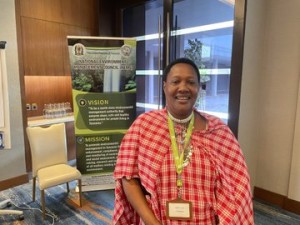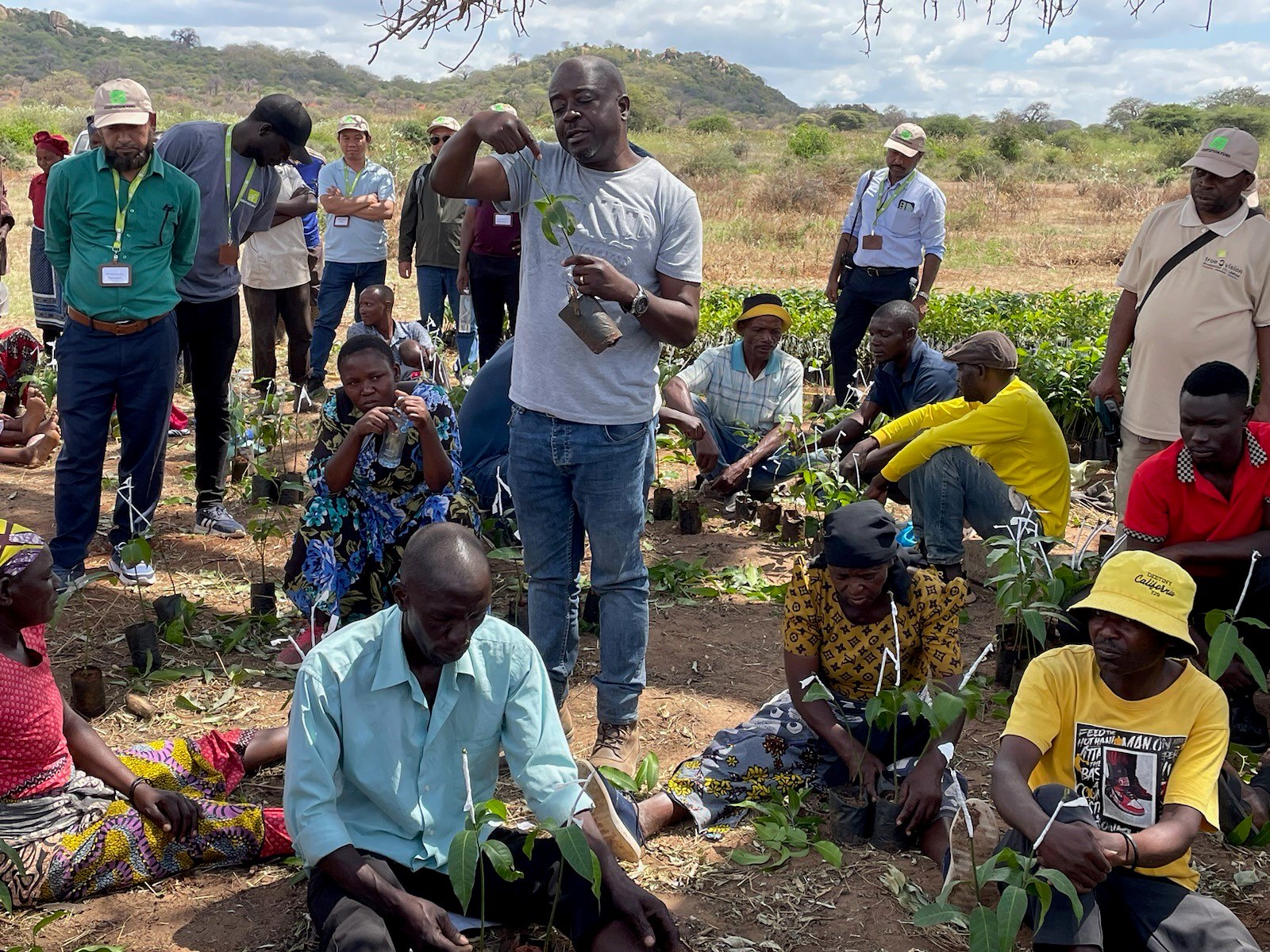Exchange included Participation from Local Adaptation Champion
Dodoma and Arusha, United Republic of Tanzania (May 13-17, 2024) — The Adaptation Fund’s annual country exchange held this May in Tanzania on the theme of locally led adaptation (LLA) brought together nearly 30 of the Fund’s accredited national implementing entities (NIEs) to learn and share best practices in adaptation.
Through the Fund’s pioneering Direct Access modality, NIEs are building country ownership in adaptation across the globe. The five-day exchange included two days of visits to AF-funded projects aimed at enhancing water security and sustainable farming against drought and temperature rise. The projects are implemented by the Fund’s NIE in Tanzania, the National Environment Management Council (NEMC), which co-hosted the exchange.
The country exchange further featured discussion of AF’s regular country projects and new LLA grant funding windows, and a knowledge fair that gave NIEs the opportunity to share experiences, successes and lessons from their own AF-funded projects. The Fund welcomed a new participant to the country exchange in Ms. Stellar James Millya, Head of Microfinance at the Pastoral Women’s Council (PWC) in Arusha, Tanzania. PWC was among just four Local Adaptation Champions selected from a group of 500 applicants by the Global Center on Adaptation last year at COP28 in Dubai. AF contributed to the winners’ prizes by sponsoring their attendance in learning events such as the country exchange.

Ms. Stellar James Millya, Local Adaptation Champion
Millya was inspired by the experience. “Thank you so much, Adaptation Fund, for inviting us for this useful exchange event,” she said. “We are very grateful for this. I learned a lot on the NEMC project, especially the irrigation project (at the school) because we do a similar project. We train the community, but also the students on the planting of the vegetables. I can see the opportunities that we can synergize with NEMC.”
Md. Mahmuduzzaman, Deputy Manager for AF’s NIE in Bangladesh, PKSF, also enjoyed the exchange. “Water is a big problem in Bangladesh,” he said. “This exchange and the visits in locally led adaptation, especially the cattle (medicinal) dip and other elements are very useful for the community, the (climate-smart) school garden, also.”
Laode Muhamad Syarif, of AF’s NIE in Indonesia (Kemitraan), further appreciated a presentation by Jean Aristide Nicaise Aman, of AF’s NIE in Senegal (CSE), during the knowledge fair about CSE’s wave deflection and mangrove restoration project to counter sea level rise. It is similar to one of Kemitraan’s projects and the two shared insights afterward. That kind of personal interaction occurred throughout the exchange.
“I think it’s a great opportunity to acquire knowledge to establish relationships, to get to know the experiences that others have already had. It’s something that enriches our actions, because you not only learn the things that others are doing well, but the limitations, challenges, the opportunities that they have had,” said Marlen Marisol Chinchilla, of AF’s NIE in Honduras, CASM. “It’s an event with a lot of potential and generates for us that richness that we can carry back with us to our countries.”
The exchange of ideas is pivotal. “It’s been interesting to see how here in Tanzania they have been able to have that capacity for resilience despite the harsh conditions, and to be able to generate all those levels of production they have achieved. It also challenges us as organizations to get a wider perspective and to build proposals with these levels of sustainability, strategy, scaling up, and how we link all of this to impact,” Chinchilla added.
Millya appreciated how NEMC projects are incorporating women pastoral leaders in the Kongwa district council. She hopes to emulate it in other districts that PWC supports and inspire more pastoral women along the way. “Meeting her [the council rep] inspired me a lot,” she said. “Pastoralist women can also hold this position, and support women to further women’s issues in climate change adaptation.”
Millya said climate change is a growing challenge across Tanzania. Becoming a Local Adaptation Champion has helped PWC build trust with the government and may lead to further opportunities. “It’s getting hotter and drier,” she said. “The challenges addressed by the community and by NEMC are really the same, lack of water, prolonged drought, death of livestock during the drought.”
The country exchange also fostered learning in younger professionals. Millya brought a junior PWC colleague to the knowledge fair, and several participating NIEs sent younger colleagues.
“For me there are so many highlights with this country exchange. I’m a young professional, so I’m new in this space,”said Mr. Papama Yose, stakeholder and community engagement intern at SANBI, the Fund’s NIE in South Africa. “The exposure that the Adaptation Fund gives us is quite crucial.”
Yose said the exchange serves to build professional growth and further countries’ capacities to adapt. Sharing knowledge between NIEs on climate finance access, lessons and successes in designing and developing projects is key. Yose said South Africa has many climate change challenges, and hopes to bring back the knowledge gained to enhance new proposals. “What I appreciate about the Adaptation Fund is their openness to guide. You can engage with them and they provide that guidance and mentorship, so it’s easy for you when you have a red flag to get in contact,” he said. “That receptiveness from them really helps the NIEs to be able to move quickly to design projects. These exchange workshops also really help us to be able to network and flag things that we are struggling on so that we can develop our capacity.”
AF Head Mr. Mikko Ollikainen praised the exchange’s value. “It gets to the heart of the Adaptation Fund’s work, empowering action, innovation, learning and sharing through the Direct Access community of practice as NIEs continue to build their respective national adaptation capacities and readiness for climate finance,” he said. “It also provides a forum for the Fund to interact with participants, provide information on our emerging funding windows, and learn from project successes and any challenges they may be facing to ultimately improve adaptation actions on the ground.”
Hosting exchanges in countries with AF-funded projects offers added benefits. Prior to Tanzania, host countries included Chile and Indonesia with adaptation themes of agriculture and coastal zone management. “The greatest significance of the country exchange is that we’ve been able to showcase to the international community what we are doing as Tanzania and as NEMC, the NIE for Tanzania, in climate change adaptation,” said Fredrick Mulinda, NEMC’s Project Coordinator. “It has helped us to learn from other people, as they give recommendations, ask questions, make suggestions. We have learned how to improve more on what we are already doing in Tanzania. As a country we are also proud to host a meeting like this. It has gone very well. I’ve seen the passion and the resilience of people in the field. We have visited different sites in [hot] areas, people have been patient enough to move around and be willing to spend more time learning in the field.”



